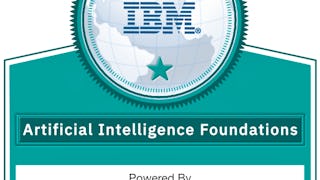- Browse
- Artificial Intelligence
Artificial Intelligence Courses
Artificial intelligence courses can help you learn machine learning algorithms, natural language processing, computer vision, and neural networks. You can build skills in data analysis, predictive modeling, and automating tasks using AI techniques. Many courses introduce tools like TensorFlow, PyTorch, and Scikit-learn, that support implementing AI solutions and developing applications that leverage these advanced technologies.
Popular Artificial Intelligence Courses and Certifications
 Status: Free TrialFree Trial
Status: Free TrialFree TrialSkills you'll gain: Responsible AI, Generative AI, Natural Language Processing, Business Intelligence, Content Creation, Risk Mitigation
4.7·Rating, 4.7 out of 5 stars22K reviewsBeginner · Course · 1 - 4 Weeks
 Status: PreviewPreviewD
Status: PreviewPreviewDDeepLearning.AI
Skills you'll gain: AI Product Strategy, Responsible AI, Data Ethics, Artificial Intelligence, Machine Learning, Strategic Thinking, Data Science, Deep Learning, Artificial Neural Networks
4.8·Rating, 4.8 out of 5 stars51K reviewsBeginner · Course · 1 - 4 Weeks
 Status: Free TrialFree TrialG
Status: Free TrialFree TrialGGoogle
Skills you'll gain: Generative AI, Artificial Intelligence and Machine Learning (AI/ML), Machine Learning, Innovation, Critical Thinking
4.8·Rating, 4.8 out of 5 stars9.1K reviewsBeginner · Course · 1 - 4 Weeks
 Status: Free TrialFree TrialU
Status: Free TrialFree TrialUUniversity of Pennsylvania
Skills you'll gain: AI Personalization, Fraud detection, Generative AI, Responsible AI, Data Ethics, Data Management, People Analytics, HR Tech, AI Product Strategy, Data Governance, Big Data, Machine Learning Algorithms, Governance, Business Strategy, Human Resources, Credit Risk, Business Transformation, Artificial Intelligence, Machine Learning, Analytics
4.7·Rating, 4.7 out of 5 stars1.7K reviewsBeginner · Specialization · 3 - 6 Months
 Status: Free TrialFree Trial
Status: Free TrialFree TrialSkills you'll gain: Prompt Engineering, Prompt Patterns, ChatGPT, Generative AI, Responsible AI, IBM Cloud, Workflow Management, Action Oriented, No-Code Development, Machine Learning Software, Natural Language Processing, Business Workflow Analysis, Machine Learning, AI Product Strategy, Artificial Intelligence, Self Service Technologies, Application Deployment, Artificial Intelligence and Machine Learning (AI/ML), Deep Learning, Data Science
4.7·Rating, 4.7 out of 5 stars34K reviewsBeginner · Specialization · 3 - 6 Months
 Status: FreeFreeA
Status: FreeFreeAAmazon Web Services
Skills you'll gain: Artificial Intelligence and Machine Learning (AI/ML), Generative AI, Deep Learning, Artificial Intelligence, Amazon Web Services, Applied Machine Learning, Machine Learning
4.6·Rating, 4.6 out of 5 stars2.1K reviewsMixed · Course · 1 - 4 Weeks
What brings you to Coursera today?
 Status: Free TrialFree TrialG
Status: Free TrialFree TrialGGoogle
Skills you'll gain: Prompt Engineering, Prompt Patterns, Generative AI, Artificial Intelligence and Machine Learning (AI/ML), Productivity Software, Information Systems Security Assessment Framework (ISSAF), Operational Efficiency, Business Process Automation, Data Security, Critical Thinking, Analysis, Innovation
4.8·Rating, 4.8 out of 5 stars16K reviewsBeginner · Specialization · 1 - 3 Months
 Status: Free TrialFree TrialDS
Status: Free TrialFree TrialDSMultiple educators
Skills you'll gain: Unsupervised Learning, Supervised Learning, Classification And Regression Tree (CART), Artificial Intelligence and Machine Learning (AI/ML), Applied Machine Learning, Machine Learning, Jupyter, Data Ethics, Decision Tree Learning, Tensorflow, Responsible AI, Scikit Learn (Machine Learning Library), NumPy, Predictive Modeling, Deep Learning, Artificial Intelligence, Reinforcement Learning, Random Forest Algorithm, Feature Engineering, Python Programming
4.9·Rating, 4.9 out of 5 stars37K reviewsBeginner · Specialization · 1 - 3 Months
 Status: Free TrialFree TrialM
Status: Free TrialFree TrialMMicrosoft
Skills you'll gain: Unsupervised Learning, Generative AI, Large Language Modeling, Data Management, Natural Language Processing, MLOps (Machine Learning Operations), Supervised Learning, Microsoft Azure, Deep Learning, Artificial Intelligence and Machine Learning (AI/ML), Infrastructure Architecture, LLM Application, Responsible AI, Generative AI Agents, Applied Machine Learning, Reinforcement Learning, Data Ethics, Prompt Engineering, Data Processing, Application Deployment
4.6·Rating, 4.6 out of 5 stars287 reviewsIntermediate · Professional Certificate · 3 - 6 Months
 Status: Free TrialFree TrialG
Status: Free TrialFree TrialGGoogle Cloud
Skills you'll gain: Prompt Engineering, Generative AI Agents, Google Gemini, Responsible AI, Google Workspace, Generative AI, Google Cloud Platform, AI Product Strategy, Productivity Software, LLM Application, Business Leadership, Unstructured Data, Tool Calling, Data Ethics, Customer experience improvement, Artificial Intelligence, Data Governance, Organizational Strategy, Cloud Computing, Collaboration
4.6·Rating, 4.6 out of 5 stars672 reviewsBeginner · Professional Certificate · 3 - 6 Months
 Status: Free TrialFree TrialStatus: AI skillsAI skills
Status: Free TrialFree TrialStatus: AI skillsAI skillsSkills you'll gain: Prompt Engineering, Prompt Patterns, AI Product Strategy, Generative AI, New Product Development, Product Management, Product Lifecycle Management, Generative Model Architectures, Product Development, Innovation, ChatGPT, Product Roadmaps, Usability Testing, Product Planning, Responsible AI, Commercialization, Artificial Intelligence, Product Strategy, Project Management Life Cycle, OpenAI
4.7·Rating, 4.7 out of 5 stars33K reviewsBeginner · Professional Certificate · 3 - 6 Months
 Status: Free TrialFree TrialI
Status: Free TrialFree TrialIIllinois Tech
Skills you'll gain: Responsible AI, Artificial Intelligence, Generative AI, Machine Learning, Applied Machine Learning, OpenAI, Anthropic Claude, Supervised Learning, Business Intelligence, Business Ethics, Technology Strategies, Artificial Neural Networks, Human Machine Interfaces, Emerging Technologies, Market Share, Deep Learning
4.4·Rating, 4.4 out of 5 stars42 reviewsBeginner · Course · 1 - 3 Months
Searches related to artificial intelligence
In summary, here are 10 of our most popular artificial intelligence courses
- Introduction to Artificial Intelligence (AI): IBM
- AI For Everyone: DeepLearning.AI
- Introduction to AI: Google
- AI For Business: University of Pennsylvania
- AI Foundations for Everyone: IBM
- Fundamentals of Machine Learning and Artificial Intelligence: Amazon Web Services
- Google AI Essentials: Google
- Machine Learning: DeepLearning.AI
- Microsoft AI & ML Engineering: Microsoft
- Generative AI Leader: Google Cloud
Frequently Asked Questions about Artificial Intelligence
Artificial intelligence (AI) refers to the simulation of human intelligence in machines programmed to think and learn like humans. This technology is crucial because it has the potential to transform industries, enhance productivity, and improve decision-making processes. AI systems can analyze vast amounts of data quickly, identify patterns, and make predictions, which can lead to innovative solutions in various fields such as healthcare, finance, and education.
A variety of job opportunities exist in the field of artificial intelligence. Roles such as AI engineer, data scientist, machine learning engineer, and AI researcher are in high demand. Additionally, positions in AI ethics, data analysis, and AI project management are emerging as organizations increasingly integrate AI into their operations. These roles often require a blend of technical skills and domain knowledge, making them accessible to individuals from diverse backgrounds.
To pursue a career in artificial intelligence, you should focus on developing a strong foundation in programming languages such as Python and R, as well as understanding algorithms and data structures. Knowledge of machine learning, statistics, and data analysis is also essential. Familiarity with AI frameworks and tools, such as TensorFlow or PyTorch, can enhance your skill set. Additionally, soft skills like problem-solving, critical thinking, and effective communication are valuable in this field.
There are numerous online courses available for learning about artificial intelligence. Some notable options include the Artificial Intelligence: an Overview Specialization and the Artificial Intelligence with Python: Foundations to Projects Specialization. These courses cover fundamental concepts and practical applications, making them suitable for learners at various levels.
Yes. You can start learning artificial intelligence on Coursera for free in two ways:
- Preview the first module of many artificial intelligence courses at no cost. This includes video lessons, readings, graded assignments, and Coursera Coach (where available).
- Start a 7-day free trial for Specializations or Coursera Plus. This gives you full access to all course content across eligible programs within the timeframe of your trial.
If you want to keep learning, earn a certificate in artificial intelligence, or unlock full course access after the preview or trial, you can upgrade or apply for financial aid.
To learn artificial intelligence effectively, start by identifying your current skill level and goals. Begin with introductory courses to build foundational knowledge, then progress to more advanced topics. Engage in hands-on projects to apply what you've learned, and consider joining online communities or forums to connect with other learners. Consistent practice and exploration of real-world applications will reinforce your understanding and boost your confidence.
Typical topics covered in artificial intelligence courses include machine learning, natural language processing, computer vision, and robotics. Courses often explore the ethical implications of AI, data bias, and algorithm limitations. Additionally, learners may study specific applications of AI in various industries, such as finance, healthcare, and scientific research, providing a comprehensive understanding of the field.
For training and upskilling employees in artificial intelligence, courses like the CertNexus Certified Artificial Intelligence Practitioner Professional Certificate are particularly beneficial. These programs are designed to equip professionals with the necessary skills to implement AI solutions effectively in their organizations, fostering a culture of innovation and adaptability in the workforce.










